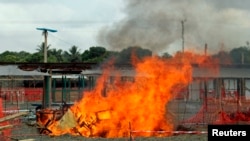The number of new Ebola cases in West Africa is dropping. But the International Federation of Red Cross and Red Crescent Societies (IFRC) says the fight against Ebola is not over and warns that complacency could lead to preventable deaths.
For the first time since June, the World Health Organization said fewer than 100 new cases of Ebola were confirmed over one week in the countries most affected by the epidemic — Guinea, Liberia and Sierra Leone.
This is certainly good news. But the head of IFRC's Ebola Coordination and Support Unit, Birte Hald, warned against a false sense of security, saying the epidemic is far from finished.
“It is really important that we keep the attention on this problem, otherwise we will risk that it becomes endemic," she said.
While the number of new Ebola cases is going down, Hald cautioned that they may flare up again.
"It is really too early," she said. "But we need also to start thinking about how to support recovery, especially recovery within the health sector and structures, because weak health structures were actually the main reason why the epidemic was able to spread the way it spread in those particular three countries.”
She said cases of Ebola continue to appear in Sierra Leone and Guinea, so suggestions that the epidemic could be over as early as May must be treated with caution.
Hald just returned from a trip to Guinea, where she noted that many cases of Ebola go unreported.
She said the hostility of some communities against health workers, especially in remote areas of Guinea, remains a matter of great concern. Red Cross volunteers are unable to access some areas because of the resistance, which sometimes turns violent, she explained.
The Red Cross has a network of 6,000 volunteers in West Africa actively involved in the Ebola response. Hald said these volunteers are well placed to provide a rapid response to new outbreaks of the disease.
Speaking to VOA, she said the Red Cross is adapting its strategy to the changing course of the outbreak. "There is not so much need for treatment anymore and focus on that," she said.
"As the numbers of people dying from Ebola is going down, we will retrain our volunteers so that they can actively engage in social mobilization and contact tracing, contact finding actually, even more active," she added. "To have a more agile and pro-active role, we will make rapid response teams that can be immediately be sent out to new districts when new cases appear.”
The Red Cross Federation says stopping Ebola is not enough and that the current emergency response will produce lasting effects only if the root causes of this epidemic are tackled.










